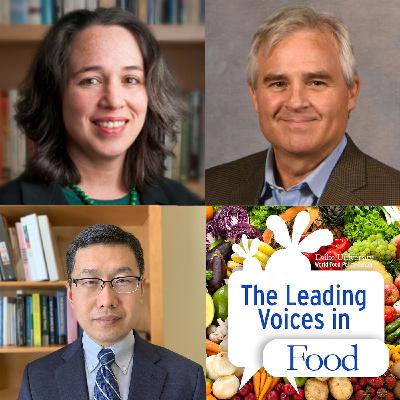E268: Why Corporate Control of Agriculture is Cause for Concern
Description
How big is too big? When it comes to corporate concentration many observers raise concerns about the tech industry. However, in the new book, Titans of Industrial Agriculture: how a few giant corporations came to dominate the farm sector and why it matters, political economist Jennifer Clapp draws attention to the overwhelming shadow a small handful of transnational corporations cast over the global agricultural sector. Professor Clapp argues that these corporations hold concentrated power over the agricultural sector that keep industrial agricultural practices entrenched in patterns of production, despite the concerns of the social, ecological and health impacts to society. She explains how we got to this point and what it might take to make changes. Jennifer's work at the intersection of the global economy, food security, and food systems, and the natural environment, looks specifically at issues of global governance. She is currently a member of the International Panel of Experts on Sustainable Food Systems, and a member of the Scientific Advisory Committee of the UN Food Systems Coordination Hub.
Interview Summary
Norbert - Jennifer, let's just jump right in and I'd love for you to help our listeners understand a little bit more about your book. You write about corporate concentration in the agricultural input sector. Can you explain what this involves and what products are we really talking about?
Yes. The book is about what we call the agricultural inputs industry. And that's really four different product types typically, and maybe a fifth that we can talk about. So, one of them is farm machinery, and that's really referring to things like plows and tractors, harvesters, etc. That kind of machinery on the farm. The second industry is the fertilizer industry, which is all about, you know, the nutrients that we bring to the soil through fertilizer products like nitrogen, phosphorus, and potash. And the seed industry. That's another industry that is a key input for farmers. And then also pesticides. And when we talk about pesticides, we're referring to things like insecticides, chemicals that kill insects, but also chemicals that kill weeds and fungus. And so those are the four sort of big inputs that I talk about in the book. But also, the book covers a fifth input, an emerging input, which is data. And this is, especially as we're seeing the datafication and digitalization of farming. Increasingly data has now become a commodity that is bought and sold as an input into farming.
Norbert - Great. I have to ask, what drew you to the input industry? I mean, let's be honest, that's not the thing that most people get excited about. Why should we be concerned?
Yeah, that's a great question. I've actually had a very long interest in the seed in chemical industry. That goes way back to the start of my career because I did studies in agriculture for my PhD dissertation. But then I got quite interested in toxic waste and then that sort of drew me to this question of the global pesticide trade. And when I learned that, you know, oftentimes, like in the US there might be a banning of a pesticide that's no longer in use. But it was still being traded globally. And this, I found this very fascinating and how that industry worked. And that kind of drew me into understanding the connections between seeds and chemicals. And then when the digitalization of farming came along and in recent decades it became really clear that it wasn't just chemical and seed industry involved in that digitalization. It was also the fertilizer and the farm machinery sector. It made me want to understand the interconnections between these industries. I know it's like, maybe a bit specific, but they have huge consequences in terms of the way our food systems look like. And so that really drew me to understand where did these inputs come from? And why are they controlled by just a few large companies?
Erika - Jennifer, I want to ask you a question about why this sector, especially related to the inputs, is so important when we're talking about food systems. And especially their social and ecological dimensions. And specifically in the book, you tease out many of the social and ecological costs of inputs such as pesticides. Also the social and ecological consequences of even farm machinery. So it would be great if you could elaborate on their importance.
Thanks, Erika. That's a great question and that's part of the reason why I was really drawn to study these inputs. Because I'm in a school of environmental studies, I'm very interested in these interconnections between food systems and environmental outcomes. I was really interested in learning more about where these industries came from, and as I was teasing out where they came from. And how they became dominated by such large companies, I also learned in much more depth about the ecological consequences of these inputs. I can just say a little bit about some of them because these consequences are so big that we almost forget to talk about them. They become embedded in the product itself. And so, one example is farm machinery. Farm machinery was originally seen as quite revolutionary and that it allowed farmers to harvest their fields much more quickly than they used to be able to before. But that also meant then that to make the equipment efficient and pay for them they might as well extend the size of their farm. And as farmers extended the size of their farm, in the US anyway, they moved west and displaced its indigenous people from the land, in terms of taking that land for farm production. But also, as farms began to consolidate and get larger, as mechanization continued, it also displaced others from the land. Poor farmers, black farmers, those who were renting land and didn't have access to their own. And so, people who were marginalized and we still considered marginalized in society today, were really being displaced from the land as a direct consequence of farm machinery. It's not that farm machinery is like necessarily something that we want to do away with today, but I think we need to recognize those historical connections. And really understand that when, you know, you see a book for a small child about farming and there might be a picture of a farmer and it's usually a white guy sitting on a tractor. We can forget that image has a lot of baggage associated with it in terms of displacement and inequality. And I think we need to recognize that. But it does not just stop there. There's also plowing disturbs the soil, heavy machinery compacts the soil so it can harm fertility of the soil as well. And the machinery part of the equation has long been a source of inequality in terms of being very expensive for farmers. It's been one of the main reasons farmers have often been driven into debt. Farm machinery might have been liberating in one sense to allow increased production, but it did come with costs that we should acknowledge.
We also need to recognize the ecological and social costs associated with the fertilizer industry. And this industry goes way back to the 1840s and we saw the rise of the guano trade. And we can think immediately of the working conditions of the workers who were digging the guano in the Chincha islands of Peru. And often they were coming from Asia and facing really harsh working conditions. But then when we saw the rise of synthetic nitrogen in the early 20th Century, the cost shifted in a way towards the cost of fossil fuels. The huge amount of natural gas used in the synthesis of nitrogen. And also, the climate consequences of the nitrous oxides that come from the application of synthetic nitrogen into the soil. So again, there's like enormous ecological and social impacts from that particular input.
Similarly, when we talk about seeds, the hybridization of seeds in the 1920s and 1930s also raise huge concerns about plant genetic diversity. And we know that in the last century or so we've lost around 75% of plant genetic diversity for crop genetic diversity. And this is because of the way in which we started to see the uniformity of the genetic makeup of seeds. The monocultural planting of seeds really reduced that kind of diversity. And then intellectual property protection on seeds that came with the hybridization of seeds also led to a decreased ability of farmers to save their own seed and exchange their own seed with their neighbors. So again, social ecological costs.
And finally, when we talk about pesticides, we have seen enormous issues with respect to pollution runoff. This kind of bioaccumulation of these toxic chemicals t
























